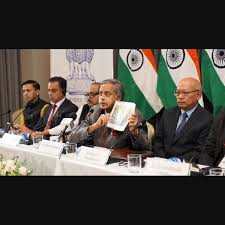‘No equivalence between those who dispatch terrorists and those who resist’: Tharoor expresses disappointment over Colombia’s reaction to Op Sindoor

Recently, Operation Sindoor, an Indian security operation targeting terrorist networks, attracted global attention. However, the reaction from Colombia drew sharp criticism from senior Congress leader Shashi Tharoor. He expressed his disappointment over Colombia’s response. Tharoor stressed that there can be no moral equivalence between countries that send terrorists and those that fight them.
Operation Sindoor: Background and Diplomatic Controversy
Operation Sindoor aimed to dismantle terror groups believed to operate from foreign soil. India described it as essential to protect its citizens from terror attacks. However, Colombia expressed concerns about the operation’s impact on diplomatic relations and human rights. Tharoor believes such concerns risk blurring the lines between terrorists and nations fighting terrorism.
Tharoor’s Clear Message
At a press event, Tharoor stated, “There is no equivalence between those who dispatch terrorists and those who resist them.” He added, “To equate nations fighting terrorism with those who nurture it is unfair and dangerous.” His strong words reflect a broader frustration among Indian leaders. According to him, India’s counterterrorism efforts are defensive, not aggressive.
Tharoor emphasized that every nation facing terror threats has the right to respond decisively. Therefore, international partners should support such actions instead of undermining them. He said, “India stands unequivocally against terrorism.” He called on the world to distinguish clearly between those who harbor terrorists and those who fight them.
The Diplomatic Tightrope
Tharoor’s remarks highlight a complex issue in global politics. Terrorism crosses borders, and actions taken by one country affect others. Many nations, including Colombia, often tread carefully in these situations. Their responses may reflect concerns over sovereignty and diplomacy.
From India’s point of view, this caution can seem like indirect support for terror groups. It can also appear as a lack of recognition for the dangers terrorism poses. Tharoor’s comments urge the global community to take a clearer stance. He calls for solidarity with nations fighting terrorism.
Historical Context of India’s Fight Against Terrorism
India’s battle against terrorism has been long and difficult. Various groups have exploited borders and geopolitical tensions to carry out attacks. Cross-border operations like Operation Sindoor sometimes create diplomatic friction. Still, India insists these measures are vital to dismantle terrorist networks.
Tharoor reminded the world that terrorism is a global menace. It requires cooperation and clear moral judgment. “We must recognize the difference between aggressors and defenders,” he said. This message resonates with many who support India’s efforts.
Reactions Inside India
Within India, Tharoor’s views found support. Many citizens and politicians back Operation Sindoor. They see it as necessary to counter terrorism effectively. Social media discussions reflect strong opinions on the need for international backing of such actions.
Critics of Colombia’s reaction argue it sends the wrong message. They worry it might embolden terrorists by showing that decisive anti-terrorism actions lack global support. Supporters of the operation insist that protecting national security is paramount. They believe diplomatic relations should not come before fighting terrorism.
Understanding Colombia’s Perspective
Colombia’s cautious response likely stems from its own experiences. The country has a history of internal conflict and continues to deal with armed groups. It may be sensitive to issues of sovereignty and human rights. This context explains why Colombia chose a careful diplomatic tone.
However, many in India view Colombia’s response as insufficiently firm. They see it as a missed chance to denounce terrorism clearly. Tharoor and others call on Colombia to reconsider its stance and stand firmly against terror.
Moving Forward: Calls for Global Unity
Tharoor’s disappointment is more than just criticism. It is a call for international unity. “We cannot equate protectors with perpetrators,” he said. “Justice and peace require clarity and action.” India seeks stronger global partnerships to combat terrorism. These include intelligence sharing and joint efforts.
Experts believe this diplomatic episode might lead to clearer international guidelines. Such guidelines could balance sovereignty, security, and human rights concerns. This would help countries coordinate better against terror threats.
Conclusion
The debate over Operation Sindoor and Colombia’s response shows the challenges in global counterterrorism. Tharoor’s firm stance reflects India’s demand for a clear moral divide. He insists that those who fight terrorism deserve global support. His message calls for cooperation based on shared values and security interests.
As terrorism evolves, the world must face difficult truths. It must forge alliances that prioritize peace and justice. Otherwise, the fight against terror will remain divided and less effective.






